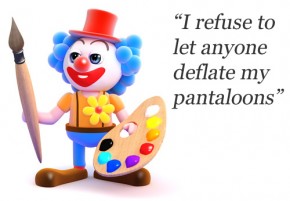Readers please note: This post was originally published on another of my blog sites ‘CreativityPro’ and the reaction over there was a mixture of hilarity (by those who have really read and understood the post) and anger from those who didn’t really read the post properly, or understand inversely motivational humour it contains. Now that this post has found a new home on DrawPj.com the humour might seem a little coarse as DrawPj is a caring and nurturing community 🙂 But still, it contains some valuable observations about becoming an artist. So that said, please make sure you put your tongue firmly in your cheek before reading, smile and enjoy the roller coaster ride!
So, having said that, on with the article…
We’ve all seen the deluded souls on Pop Idol shows, absolutely convinced that they are the next big thing, staring open mouthed in disbelief as the judges proceed to tell them that they have no hope whatsoever of going anywhere anytime soon with their dream. Are you the equivalent of that person in the art world?
If you are thinking about making the big leap into the professional art world or even if you’ve been in it for while with limited success, here are some very good reasons why you should bring your dreams to a screeching halt and go and live 9 to 5 in a cubicle.
1. You are really not very good at Art
Yes, your Mum says you are ‘so very talented’, and Uncle Ernie used to paint a bit so it must ‘run in the family’, but really, are you any good at art whatsoever? Good art has a certain something about it, an aura, special magic or just down to earth old fashioned skill embedded deep within it. It outshines other lesser art when placed on a wall beside it. Can your art do that? Can YOU do that? I suggest you think about this very carefully before you embark on your journey as professional artist. If you haven’t got the chops go and learn some technique. If you haven’t got any original or interesting ideas then go and learn how to think like a professional artist. Be honest with yourself. If you are not particularly good at art go and get a real job instead and save yourself a lot of disappointment.
2. You are Lazy
Art and being a professional artist is hard work. Yes, you may of heard about artists who seem to stumble from bar to bar, retreating at night to their studio to throw paint at canvas for a few hours of creative angst, but is this the reality of being an artist? Can you be a lazy stumbling bum and make money in this game? The reality of being a professional artist is that it is hard work, with lots of effort, thinking, organising, marketing, strategising, researching, learning, networking, and pure relentless obsessiveness with no guarantee of financial return as you make a name for yourself. Sure you might be able to slack off a bit when you finally ‘make it’, but in reality you’ll probably be in so much demand that your art dealer keeps wanting more and more from you. If you are bone-arse lazy go and get a real job where you can expend a minimum amount of effort to get by and still get paid.
3. CA$H! You are purely motivated by the lure of easy money
‘I could do that!’ you exclaim as you walk around the art gallery. ‘$3000 for a paint splat. Money for nothing! I want in on that action!’ you think to yourself. In reality the artwork that you see on the wall selling for many thousands of dollars is probably created by an artist who has spent many years developing his or her reputation to the point where they can justify a high price. There’s a whole story of development, exploration and experimentation going on behind the scenes that you just don’t see by looking at an artwork hanging on the wall. Then there are the costs involved such as advertising, materials and the gallery’s percentage. Pretty soon that $3000 is whittled down to $1200 profit for the artist. Coupled with the fact that this artist might actually only sell one of these paintings every month, the Ca$H angle starts to look a little pale if that is the only income that the artist has until their next big exhibition, which might be only every two years with a serious gallery. If you want in on the easy money scene there a plenty of other ways out there described in downloadable ebooks with ‘guaranteed systems for generating CA$$H with absolutely no effort on your part whatsoever’. If these don’t work for you, then consider a real job where the easy cash pops into your bank account simply for turning up to your cubicle every day and looking busy.
4. You have no business sense
‘Yes’ you have decided, ‘I will be a professional obsessive artist, creating fantastic artworks in my studio, the value of which will skyrocket when the world finally sees them and recognises my genius’. The question is who is the person who will get those artworks out of your studio, into the world and in front of buyers? Who will put them out there day after day until one day there is a breakthrough and you finally become recognised for your genius? Certainly at the early stages it will be YOU; at least until a super high profile Gallery director steps in to take care of all that nasty business related stuff like schmoozing collectors, marketing, sales and paying the bills. Exhibitions cost real money. Art materials cost real money. Marketing costs real money. You could seriously go down a financial black hole if you’ve been working on an exhibition for the last six months only to have the exhibition completely tank. If you have no business sense go and get some before you start. Even if you do manage to avoid this by finding someone who ‘takes care of business’ for you (who you would presumably pay handsomely for the privilege), you are leaving yourself wide open to being ripped off if you have no clue what’s going on in your accounts or your business. Go and get a real job if all of this business stuff seems too much trouble.
[et_bloom_inline optin_id=”optin_3″]
5. You like financial security
Oh how comforting is the steady ebb and flow of money into your bank account as you work away in your day-to-day job. The bills are paid regularly, there’s food on the table and your retirement plan is building nicely for when you quit work at 60 and sail around the world on a never ending cruise ship holiday. When ‘the system’ works it’s great. Everything is taken care of and that’s why the system is designed this way. Comfort. On the other hand, picture this. The artworks you make cost you time and money to create. There is no guarantee of sales. Occasionally someone buys one of your artworks and bumps your bank account up a bit. You have an exhibition to prepare for and all the time you are working on this you will not be paid. Your Gallery Director tells you that half of the exhibition expenses such as advertising, food, drink and staffing will be taken out of the up front sales of your artworks, so you won’t make any money until you sell a few thousand dollars worth of paintings. Oh and the gallery takes 40 to 50% commission too. Does this sound inviting to you? If you are already financially independent then go for it. If like the rest of us, you still need to get paid in order to get by then think very carefully. You’re a bit like a venture capitalist, investing in your own future potential to make lots of money. Do you have the confidence to back yourself? Will you bail when the going gets tough? If you love your financial security blanket I suggest you be happy with your lot as a “Sunday Painter”. Don’t give up the day job.
6. You think that being represented by a Gallery will be your ticket to financial security, fame and fortune.
Out of the thousands of artists in your area, only a few are actually represented by your local upmarket art gallery. You think to yourself, ‘surely if I can get my art accepted by that gallery my work will sell’. Let’s face facts. Yes, there are galleries out there which just by being represented by them will confer some kind of specialness and value on your art. They can command many thousands of dollars for each artwork by their artists, and art collectors buy from them because they know that the chances are the art they buy will appreciate in value. If you can get into this gallery then the chances are that you have done a substantial amount of work to get there. You are an established and serious artist. These kinds of galleries tend to only look after a small stable of artists and don’t tend to bring new ones in very often. You may have to look elsewhere for gallery representation, towards the galleries that take a chance on new and emerging artists. They turn over new artists all the time, looking for gems to build up a stable of steady sellers so they too can become established and serious. There is no guarantee that you will sell anything in these galleries, but they are the ones that may take a chance on you. Yes, being represented by the right gallery can be a ticket to fame and fortune for some, but it can take years for a gallery to build your reputation. Are you willing to hang in there long enough until you are an established artist? If you are impatient try representing yourself. At least you will get to keep all the money you make. Otherwise go and get a real job, save your money, make some wise investments and you might get to retire early and live out your artist dream some way down the track.
7. You’re brilliant. Everyone says so. But you’re not quite sure
You know somewhere deep down inside that your artwork is absolutely remarkable, but you don’t really like to show people because it’s not quite perfect yet, but because everyone is saying you’re so good you’ll give it a go anyway and see what happens. If this is you I gently suggest the following – “GET OVER YOURSELF and do it QUICKLY”. Perfectionism is great, but know when to stop. Nobody cares if your painting is finished in your eyes, it only has to be finished in their eyes! Here’s the news… no artist that I know of is ever completely content with their artwork. There’s always something that can be improved upon, but you have to end your relationship with your artworks at some stage because you have to sell them. If you are reluctantly giving this profession a go but secretly think that you and your art are never good enough then make it easy on yourself and save yourself from misery. Go and get some therapy for your perfectionism, work on your self esteem and get a real job so you can be a miserable perfectionist on someone else’s money while you do this. Revisit being an artist when you’ve actually read and understood the contents of your motivational book collection.
8. You expect instant success
Lots of artists are an instant success. You see them pop up all the time in the press and on the TV. They come from nowhere and suddenly command huge sums of money for their artworks. In reality though that perceived instant success as reported by the media happened as a result of years of work on the part of the artist. Like most things in life, being a professional artist takes time, experimentation and a lot of hard work. Reputation takes time to build. Prices take time to build. Your business will take time to build. Your instant success as reported by the media will take time to build. You have to be in it to win it for the long haul. If you are impatient then maybe you should look for quick success and satisfaction in a real job. Look for a job where someone else has already built a money train for you to hop onto and is willing to pay you with cash and equity to translate your impatience for success into growth for their business.
9. You like to be completely in control of everything
You turn up to your first ever exhibition opening night and look around at your artworks which the Gallery Director has hung impeccably. The show looks great. ‘But wait…that painting over there, it isn’t in the right spot, it doesn’t look right and the lighting isn’t as good as it could be. It must be fixed or the whole show could be a disaster!’ In a worried huff you decide to tackle the gallery staff about the issue. They think it looks just fine and tell you not to worry. You insist. It must be changed or your grand vision will be compromised. The Gallery Director hears the discussion and comes over. He disagrees with you. You start to get a little upset. The Gallery Director has an ego that’s just as big as yours and he starts to get a little offended that you would question his hanging of your exhibition in his gallery. Pretty soon the situation escalates and it’s ‘handbags at ten paces’. Your need for total control is about to see you ejected from the gallery’s stable of artists after your first opening night! The situation described here may seem extreme but it does happen. It’s an easy situation to get into because like you as an aspiring superstar artist, Gallery Directors tend to have large egos too. It’s a character trait that gives them an extra swagger when dealing with artists and a larger than life aura when negotiating with clients. It’s a Yin and Yang thing. If you like to be completely in control of everything and are uncomfortable about letting your gallery do what they are best at maybe you should find real employment (possibly as the Dictator of a small country or a Hot Dog Stand operator). Of course, when you become a huge success and the money is rolling in you can afford to be a bit of a diva. Until then negotiate nicely or find alternative employment.
10. You’re not willing to compromise your art by being ‘commercial’.
Believe it or not some artists do not want their art to be seen by the masses. They want it to be exclusive, for the select few who can appreciate it, thinking that this exclusivity will demonstrate that they are serious artists. These kind of artists definitely do not want to see their art on wine bottles, t-shirts, drink coasters, posters. They do not want to change their artworks in order to accommodate a client who likes cats. They do not want to do a commission because the client wants a piece that is a little bit like the one that just sold to someone else. They do not want to paint subjects which people actually like to buy. They are unwilling to compromise their colour schemes in order to make their art easier to sell to people with fashionable homes. These artists just cannot and will not bring themselves into the commercial world whatsoever lest they devalue their Art with a capital A.
Lets face facts:
- If you like to sell your work then you are indeed a commercial artist.
- The work of famous artists has to be seen by the masses in order for it to become famous.
- You will find the work of famous artists on postcards, posters, books, mugs, umbrellas, watches and other assorted memorabilia in just about any major city art gallery souvenir shop.
- Some of the world’s most famous contemporary artists work with commercial companies to create images to promote their products.
- Not everyone can afford your paintings, but if a million people want to buy your postcard for two dollars who cares?
If you can’t stand the thought of your art being in the commercial world, create your own job and become a professional non-commercial artist by writing lots of grant applications to extract money from government organisations to fund your non-commercial ideas. Does filling out grant applications for a living sound like fun to you? The commercial world of art beckons once more…really, it wouldn’t kill you to paint that cat.












Nope, you can’t put me off. You’ve made me more determined than ever to go ahead with a career in art. You can take your tongue out of your cheek now.
Mody
When i initially saw this I thought, wow, what a pessimistic piece of crap. But, he’s right. It’s all about drive. Gumption. Patience. Failures. And above all else, sweat. And tons of it. I was put off by 19 galleries in my first 5 years after school. In the last year, I’ve sold nearly everything I’ve made in 4 shows. Find a niche. Carve it out. Push it as hard as you can. Suffer for it. Uncertainty is everything. Prepare to be prepared to die for your work.
i think that you are right and that it does take time and effort and that it does take a lot of sweat to get to where you want to go
Amen
Wow this is cynical. Obviously written by someone who struggled to draw smiles and did either very poorly or never took anatomy!
Please re-read the article… read further than the bold headlines. There is a tongue in a cheek and humour to be found. Others have discovered it / commented on it. Read between the lines and you will find it too 😉
Ikr! I feel the same way.
This was a brilliant article and great advice. Thanks for the reality check and for putting a smile on my face. Now…onward to my studio to paint!
NOOOOOoooooooooo!!!! NOT a DAY JOB PLEEASE!!!!
Good article. To the person that said. noooooooo not a day job. Are you a full time artist? How do you do it? I am working but really tired of having a day job. Are you working alone?
well my 19 yr old thinks he has his own style , that will be as big as ed hardy. no community college, he wants the pasadena art institute, at 15k a quarter. we are bad parents when we say no. i would like to share this article with him . maybe it will hit a nerve. as hard working parents, what do we know about life.
If your son is actually pretty lazy and thinks that the word will beat a path to his door just because he can draw a bit, he’s probably got some frustrating years ahead.
On the other hand…
If your son has a modicum of talent, imagination and a loads of get up and go then there’s absolutely no reason why he cant make a career in art, with or without a high priced school. Heck some of the greatest artists are art school drop outs anyway…why?..because they were so obsessed with doing great art and making a career out of it that they didn’t want to waste time in class…they just got out there and did it!
Encourage him to do WHATEVER it takes to ensure success – because thats the way to really raise the chances of making a solid career.
This is from a man of 60 who has worked in art related jobs all my life. I am a commercial graphic designer in addition to owning and operating a sign business and an emerging art gallery. I suggest to all of you who are struggling to make ends meet to get a day job in art related fields. Sit in a park and think about what would make a great t-shirt or poster or other and then produce and market them yourselves. This is how I started all of my businesses and it’s never been dull. All it takes is desire and then committment. I would much rather fail while trying than fail for lack of trying. That way, I can speak with authority when I tell someone to either do that or don’t do that. This site is crammed full of excellent advice, so heed it.
Gary; My son just graduated with a degree in an art related field… I told him the life of an artist can be successful but you have to hit the ground running… I think it would be good to contract with an innovative talented online international company that specializing in putting art on different formats (stickers, etc.) What company would you recommend?
There are lots of online companies that make products containing art. To get in at the ground level you can set up quickly and easily using sites like Cafe Press, Red Bubble, or other sites that will drop ship products with you logos, designs and artwork on them. Its up to the individual though to promote those sites and sell product. If you’ve got something unusual, original, or just plain viral, then these places might be a good place to start.
Of course there are real physical product companies who buy, commission or pay a percentage to use artwork and designs from artists, but unless you are a name artist, or can fill a specific niche then they might not look at a new designer, or offer terms that are going to make the desginer rich.
I’d be inclined to start my own thing and build from there. When there is proven $$$ demand your boy will be in a position to negotiate.
I agree with Gary. 58 years old, and I’ve been an artist in some capacity for all my life. After leaving school in the 70’s, I had a romantic view of life as an artist. VERY hungry, after 3 years I enlisted in the USAF, became an aircraft technician and instructor. Still, I pressed on with art. I painted, did small commercial jobs and taught myself 3d. I carried on with life as a practicing artist the whole time. USAF retirement allowed me to go on to a 3d career in the 90’s. I worked as a simulator artist, 3d texture artist and technical illustrator, then started my own business with a new interactive commercial art product. I now have an extremely marketable resume, and can wear many hats. I now have many skills, but central to my being is the soul of an artist. An artist is what you are. A job is what you often times have do to make a living. Try not to confuse the two. My point is, don’t ever stop, don’t let it go. Use your creativity in everything you do. Find what you need to do best feed yourself, and if you can’t make your art work for you at your job, let your job help your art evolve.
I take it you’re not a professional artist, I can’t think of why one would ever write an article like this. My sister was an illustration major at the U of Arts in Philadelphia. She found a job drawing prints for fabric in two weeks after graduating. Her designs have been purchased and she is making good commission on top of her base salary. The kicker is, she NEVER tried to find a steady, long term “real job”. You don’t know what you’re talking about.
Chris,
1. You need to read further than the title of this post in order to understand it.
2. Salary? Sounds like your sister has found a real job. (good for her!)
3. I’ve been there, done that, and bought the t-shirt professional artist-wise.
4. I know what I’m talking about 😉
i was thinking the same thing when she said “base salary”. Lol. Good for her what a fortunate artist.
A very informative article. Speaking as an artist who does have a day job (In the health care field.), I have always believed that some sort of day job is an absolute necessity for any artist, expecially in the present economy. Since my leaving the military, I have been off and on pursuing an art education while working in the public and private sector for the past 25 years. During this time, I have seen the art world from pretty much every angle, and because of this I’ve made a conscious decision to keep my day job for the forseeable future.
Due to a service related disability, I have difficulty with the business side of art, so its been one step at at a time in the learning
process. That said, I do still have complete creative freedom, along with my personal and artistic integrity. I answer to no one. And that is one of the better things about having a day job, because your income does not rely on the whim of some imperious gallery ownwer, collector, or art director. You can walk away from these people, say no to big corporations, and still be able to pay the rent, put food on the table, and purchase materials.
As far as my own expectations, my overall goal is modest at best, which is to earn part of my income from the art. The rest comes from the day job. Some people reading this will think that I may be throwing away an opportunity, and while I am open to new posibilities, keeping my artistic integrity is whats most important. But again, I am not telling other artists what to do with their careers. Life is indeed a balancing act, and just where on the scale one wants to be is up to that individual.
I wanted to reach through the computer and rip your **** off your crotch when I scrolled through and read all the bold print. I won’t lie, I didn’t read it at all, just the bold print, and then I read through the comments. Now I just got done reading a few paragraphs and see your points. Well done my friend! Before anyone else makes the same mistake I did, read this article. It’s not as disheartening as it may seem, unless of course you suck at art.
I agree with the blogger and I would add the con of studio rent. I live in London where due to high prices I find impossible to afford to pay a studio to continue my artist practice, so since graduating I’ve been doing short films as editing doesn’t require physical space. I’ve tried to get a foot on the business by working in art galleries, but although I am art graduate with Master’s and diploma in art business by top auction house, I’ve failed. It’s really competitive landing a day job in a gallery. Therefore I make do with jobs not related to art which distract me from my practice but pay bills. Why don’t I move out of London to a cheaper area? Because all the day jobs are in the big cities where rent and living costs are high. It’s really a catch-22 situation.
I found your article inspiring I have a friend who has become a successful artist in pop art he had a gallery with investors short lived when the economy turned I had the oprotunity to sell my work in his gallery and did well till it closed .He still doing quite well on the Internet and marketed him self on wine bottles and CDs covers.He is always incourougeing me to quit my day job and just sell my art and offered to show me how ,he says my work is very marketable,.I have recently sold 4 paintings to a high end fine French restaurant ,however at a great discount because I have always dreamed of having my art out there for everyone to see.So I know my work can sell,were am I gong with this . still afraid to quit my day job lots to learn in the business end of art and the perfectionist part of me wants to do it perfect or not at all ,keeps me from moving ahead .I am growing to hate my day job though it has some artistic side to it .I just want to paint ,that’s all I want to do .However I have so many financial responsibilituy to my family. I day dream all day about having a art business like my friend.He has put a lot of effort to get their ,worked as a bartender at night art at day.So iam sharing this story because it relates to what you have said in this post. Look Forward to get your input .Thank You gave me a lot to think about .HaHa that’s probably my problem sometimes you can over think it.Smile
Maybe try what I did to start out. I negotiated with my employer to take one day off a week and work on my art. Then when the opportunity was right, and I’d saved up a little cash I quit and worked on my art full time. Then I followed my full time pro artist dream with some success for the next 5 years, until other creative avenues that I’d never thought of opened up to me (due to the 5 years of pro art experience), and today I make a full time living off just my ideas…which can be anything I want them to be as I’m now lucky enough to be free to do what I please (again due to the 5 years of pro art experience, not because I just got lucky, it was hard work to make my dreams crystallise into reality and it continues to be)…I’ve moved beyond the limitations of a canvas but its all still art. I’ve always been a multimedia kind of guy 😉
Dear Stuart, thank you for your reply.Funny you had said that,I actualy had tried that approach,boss not so keen on that idea..He said I should try my other ideas on my days off . He has a point,I have not committed all of my time off to my art.Get busy whith day to day stuff.I think it’s time to make a plan ,commit more time to my love of art and put some backbone into it .Like you said hard work can pay off.when timing is right then go for it.Yes dreams can be a reality ,they don’t happen over night.Just as I always dreamed of having my art at a gallery and a high end restaurant ,it took time.
Iam a multimedia gal my self ,just recently bought a ILc camera to take good pictures of my work,then thought maybe one day try my hand and eye at photography pro .You just never no were life will take you.that’s the beauty of it .Us artist no that and can share that for all to see.
Dear Stuart, thank you for your reply.Funny you had said that,I actualy had tried that approach,boss not so keen on that idea..He said I should try my other ideas on my days off . He has a point,I have not committed all of my time off to my art.Get busy whith day to day stuff.I think it’s time to make a plan ,commit more time to my love of art and put some backbone into it .Like you said hard work can pay off.when timing is right then go for it.Yes dreams can be a reality ,they don’t happen over night.Just as I always dreamed of having my art at a gallery and a high end restaurant ,it took time.
Iam a multimedia gal my self ,just recently bought a ILc camera to take good pictures of my work,then thought maybe one day try my hand and eye at photography pro .You just never no were life will take you.that’s the beauty of it .Us artist no that and can share that for all to see.
P
I found your article inspiring I have a friend who has become a successful artist in pop art he had a gallery with investors short lived when the economy turned I had the oprotunity to sell my work in his gallery and did well till it closed .He still doing quite well on the Internet and marketed him self on wine bottles and CDs covers.He is always incourougeing me to quit my day job and just sell my art and offered to show me how ,he says my work is very marketable,.I have recently sold 4 paintings to a high end fine French restaurant ,however at a great discount because I have always dreamed of having my art out there for everyone to see.So I know my work can sell,were am I gong with this . still afraid to quit my day job lots to learn in the business end of art and the perfectionist part of me wants to do it perfect or not at all ,keeps me from moving ahead .I am growing to hate my day job though it has some artistic side to it .I just want to paint ,that’s all I want to do .However I have so many financial responsibilituy to my family. I day dream all day about having a art business like my friend.He has put a lot of effort to get their ,worked as a bartender at night art at day.So iam sharing this story because it relates to what you have said in this post. Look Forward to get your input .Thank You gave me a lot to think about .HaHa that’s probably my problem sometimes you can over think it.Smile
This is all true, very true in fact. If you want to be an Artist you have to work at it, every single day… This is not about going to school and getting a fancy degree and going into making t-shirt prints and logos, this is far beyond that. This is sleepless nights, paint fumes, aching hands, baggy eyed, haven’t showered in days, kind of thing. I’m going through this now because I am completely 150% dedicated to my work! I’m in school now taking classes just to attempt to grow more, and play around with different mediums, but when I’m home in my studio, there’s no playing… I’m either drawing lines for 5 hours or painting for 8.
Ahh yes, I remember those long days in the studio… baby in one hand, 50 canvases to finish for an exhibition the next day in the other 🙂
Serious art can be serious hard work 😉
A creative soul combined with a work ethic is both a blessing and a curse!
nice article, i do some art part time. this is more the artiest of to days world so u need a good job, and i do think art is a talent.
I love this article so much!! Someone emailed it to me and I just thought it was genius! I like it 🙂 couldn’t stop laughing at how true it is! Bluntly honest too. I’m a fan 😀
Wow. I’m an aspiring artist and I happen just to come across this by chance; originally clicking it because I thought it was going to be offensive. But now I’m quite glad I read it. This was an interesting article and it made me question my motives and such.
I’m just 13, but everyone says I have the artistic ability of someone way beyond my years. I have for all forms of art, but I specialize in manga and I’m working on my realistic style.
I’d commonly say that art runs in my blood, my Grandfather was a sketch artist for a branch of the American Government, My father is a retired artist, my aunt is a part-time commercial artist and two of my cousins are designers.
So Thank you very much! This article was abruptly honest and to the point!! It’s made me want to try harder to succeed in a tough field!
Hi seraphina, I think by now you’d be like 15? Currently im almost 15 too, in tenth grade and I should be getting closer to deciding on a career since ill be graduating in two years time.. if you don’t mind, I’d like to sort of get in touch with you and see your work (to compare) since people say the same thing about me as you. Its not often that I find people my age in the art scene (maybe because I’m currently in dubai and its not very artsy nor social networking based) and even when I do, theyre usually very abrupt people. Please contact me on my twitter @rawoonxoxo or at least don’t hesitate to reply here! We have a good few things in common, and networking is great! Ciao! xx
The one thing that really depresses me is that I am good at art and creative work, genuinely good, but I really don’t have any aptitude for marketing speak or the digital age (i’m 32 so not ancient, but I still think paint and film, and vinyl superior to the capitalist sham that is pixels and mp3s)
I just can’t kiss ass enough to be successful in any job – I will be eternally poor 😛
Think like a business or an entrepreneur. Do you have a friend or a family member who is good at marketing and business. If so offer them a percentage of your business to bring them in as a partner in your business (because face it to be a successful artist you have to think of you as a business and a brand).
The question is…
does the pain of being eternally poor and not being successful in a kiss a## job give you enough motivation to decide that today you will do whatever it takes to overcome your perceived self limitations?
We’re all not good at something, and have likes and dislikes about how the world should be, but to change a situation sometimes we just have to decide that we are going to get good at doing whatever is holding us back.
That was a brutal dose of reality, and as an art major I appreciate the realistic outlook. I learned all this, and I know it’s a long haul. But, I have the real job to back me up, and someday maybe I’ll see my own work on postcards and overpriced coffee mugs. I can only hope. I’m still poor now, and I ain’t even an artist yet. I think I can make it. If I need a dinner, I’ll paint one. I’m ready for the game.
Being poor is one of the best motivations for actually doing something to be not poor.
Very insightful. Although the concept of quitting my extremely stressful 60 hour/week job is appealing, it isn’t really my motivation. I do like the idea of making real money doing something that I enjoy, but what I really want is to leave my mark on the world. I want to create art that will be appreciated centuries after I’m gone. My concern is that I don’t have the time or networking skills to get myself out there. I can’t afford a website. I don’t have a proper portfolio. And my only marketing efforts are my Pinterest account.
I have developed a small following (very small) in Tofino for the surfboards that I paint, but I can’t really foresee any longevity there. There isn’t much money in that market, and I don’t imagine the art historians of the future dissecting the artistic quality of a painted surf board, no matter how well maintained it is.
To be fair, I’ve never had any kind of training, and until 5 years ago I didn’t even know I possessed any artistic ability, so I guess my expectations are unreasonable. But in case there is any hope at all does anyone have any advice?
Cory,
As they say.. where there’s a will there’s a way 😉
Is there any way you can think of cutting back the days you work?
Thats how I first extricated myself from the 9 to 5… just by taking an unpaid day for myself every week.
My wife managed to make her transition by ‘Painting In Her Pyjamas’… ie reclaiming the small blocks of time that she had available to her, rather than waiting for the big blocks of dedicated time that never comes.
Wow. A lot of people who are actually extremely talented don’t believe they can make it as an artist work mediocre jobs. No need to be cynical and extremely rude because you’d dont enjoy art and have no talent, understanding or inspiration whatsoever. I am 20 years old, I love art, and I’m decent at it. However, I happen to realize that there is little opportunity in making a career of doing what I love, and therefore, I work at a grocery store, and am in the process of acquiring a associates of science degree until I find what I truly want to do. I have worked for the last seven days and today is my first day off (guess I’m not so lazy after all). I am drawing, relaxing for the first time since God knows when, when I wonder if there are any real jobs out there that can involve creativity and art in today’s world. So, I google “real jobs for artists”. This is the first result. Horrible. How do you know that a person who is talented at art is talentless or lazy? How do you know ther isn’t some hopeful little boy or girl out there who isn’t the next Van Gogh, Picasso, or Monet? And how do you know that you aren’t preventing them from reaching their full potential by writing a idiotic article by someone who doesn’t understand what art is. People who knew Van Gogh thought he was a mad, talentless drunk (what does that make them… Or you?). When I draw or paint, or whatever, I don’t think about money. All I think about is what my message is, what I am trying to convey. If I did art and got my ideas and thought on paper throughout my entire life, and it looked good enough for people to stare at it, and think about it, and it carried on my ideas and beliefs, it would carry on a part of me. I believe that’s all any artist really wants, any true artist. I hope you read this, and when you do I hope you realize how ignorant and insecure you are.
P.S. If Miley Cyrus is a “musician”, why can’t I be an artist?
Sara,
You actually need to read this article in full, and the comments that have followed in order to understand it (not just the bold headlines).
If you want to be an artist of the professional money making kind this article is a checklist for you, but I’ll invert it so you understand what this article is really saying…
ie
– Make sure you are talented,
– Posess some ‘get up and go’,
– You are in it for the long haul
– You understand how business and accounts work
– You are willing to back yourself and your ideas (no matter what)
– You understand how Galleries work…
etc etc
I could have written it that way round but it wouldn’t have been half as entertaining 😉
P.S. I’m sure Miley Cyrus is a musician, and you can be an artist if you want to be.
They threw Mozart into a pauper’s grave. He had a job.
I’m surprised. There are people above the age of 10 who really think that that can make it in such an odd business as art with no bidness sense?? LOL
YOU ARE HILARIOUS! You’re clearly working in the writing (artist) world. “Some people” told you that you were an artist, but you never really understood the visual aspect of artistry. Your first mistake is writing a novel; then expecting artists to read the entire thing.
Artist’s have a gift, I myself am an artist. I held the highest grade in Creative writing through high school and college. Although, reading was never my thing. I don’t have time! My mind moves too fast, HELLO 🙂 ! I pursued my art at 18yrs of age (now 24), through galleries, awards and a fast growing clientele in portraits, landscape, cityscape, portraits, portraits, and mooore portraits. Yes, galleries featured my art, but told me what they wanted me to paint; to me that’s not art.
I understand that you think, artists have seemingly unrealistic expectations. I think, art is truly the emotion and piece of ones self that is created into a piece, of art. I know that producing original art can be draining. So, if someone finds art to be too emotionally exhausting, they should absolutely have something else to fall back on.
I have found a career that allows me to be creative. I’m a very successful stylist at an Aveda salon but hope to continue painting (a real job) as an artist, in addition to my current career.
To the “REAL ARTISTS” who are reading this…I encourage you!!! Find a career that makes you comfortable financially if you aren’t already, then go from there :). NEVER CHARGE LESS FOR YOUR ART THAN YOU THINK ITS WORTH!!! You can sell 20 paintings for $50, or one for $1,000. You know you regret selling paintings you put your heart into for fifty bucks! Recognize if your clientele is stripping you of your passion; I started to hate painting (at the time) because it became a job; I couldn’t handle that.
If you have the guts to put your entire heart and soul into producing art as a career I commend you! People and galleries are just as demanding as they are in a corporate world, if not more. If you can do it, you are a true professional.
Nope I must disagree. Some people tell me I’m a pretty good visual artist too, and matched words with $ to truley show their appreciation 😉 but thanks for finding the art of writing hilarity actually hilarious.
I’m 13 and I’m looking ahead on my own personal research, the reality check is killing me. It may be for a good reason, Yes I am going to college, Yes I am young but I Do indeed know what I want, and that’s a chance to Be an Artist. A kid can only dream, I know.
All I have to say is thank you Stuart. THANK YOU
Just because your good at art doesn’t mean you should try to be a full time professional or famous artist is kind of how I feel personally..
Its kind of a bummer because people are like be all you can be but you have to make a judgment based on your own abilities and your tolerance to the difficulties of making good art.
Interesting view there
Sozo,
I read your extensive comment with interest [now edited extensively above], and yes, its easy to miss the point of this article, as it contains some inverse English ironic humour which I explain in the very first paragraph of the article. Goodness knows I may have been guilty of all of these things myself at some stage or another, hence I am able to write about them from first hand experience (ie I was that artist – for a while at least), but with persistence I got over myself and improved (as most determined people will) 😉 Cheers!
Futile, pointless waste of time and money, money goes out making the art and none comes in, my art is good, but the “career“ lol is not desirable, neither is money, unless it is for basic needs, I can hardly make ends meet.
Thanks Stuart, I am into pencil portraits. just few yrs in it n I’ve been starving too cus I think people don’t know me yet, but really have very nice words anytime they see my work. I av great love for music n hoping to be a big rapper some day. can raise income tru art to further my music career?
Where to start. I will give my life story thus far:
In my 20’s: went to animation school, worked at a warehouse part- time as a student. graduated animation school at age 26. Realized there was no where to apply nearby as an animator, so stayed at warehouse job for another year. Quit warehouse job as student contract expired, continued to develop art portfolio while working other warehouse jobs. Landed a solid warehouse job at age 27 with great benefits, pay, hours, etc- decided to take it on while pursuing career in art – THIS was the first indication that it was over before it started, but didn’t see it then. Or, actually saw it, but denied it. Landed a popular children’s book gig in my late 20s (freelance – stayed at the warehouse job during the meantime). Completed 3 books, and that was it -contract over, heard no more from them. Never knew why.
30’s – now married, in our own place, kids born just a few years into the 2010’s. Still at warehouse job, but have ventured into trade shows, craft shows, city festivals, fall fairs – you name it. Started drawing portraits/caricatures at these events, and was making some serious $$$. Travelled a lot, put in many many hours to make things work, and was able to make some serious money for the next few years at it. Enough to pay bills, mortgage etc, and still have some left over.
Mid 30’s – still doing the travelling “circus” gig, drawing portraits at various events- quit the well-paying warehouse job to continue the pursuit of art. Eventaully, began getting tired of the grind and the crowds at the festivals and events, so sure enough, went back into part-time warehouse work a few years later into my mid-30s.
Late 30’s – still working part-time warehouse, and still doing part-time caricature/portraits at shows and events, quit the warehouse gig (yes, again) and landed a big gig doing freelance children’s books (yes, again – but with a different client). Work was steady for 3 or 4 years, making decent coin. But as predicted, slowed down to a crawl in early 2016 and now in my early 40s, with 2 growing kids, a mortgage, ageing vehicles, ageing house, repair bills mounting – finally decided to “screw” the art career and go back into warehouse full time to obtain a solid pay cheque once and for all. Landed a warehouse gig in a huge corporation which is big on safety, excellent pay and benefits, fair hours, awesome people- finally found a non-related art job that I was happy with and even looked forward to going into each day.
Early 40’s – today, still in the same warehouse gig. Still doing freelance art on the side which, at times, brings in several few-thousand dollars monthly ontop of an already excellent warehouse paycheck. Really believe I have found my stride. Great day job balanced with a side-freelance gig which brings in great extra cash.
For the first time in my life career-wise, I am truly happy. Every day I have no problem waking up, going to my warehouse gig, coming home and continuing to work on paid art gigs.
How did I do it? I stopped identifying myself as an “artist”. I let go of it. I stopped the silly fantasy of sitting home all day, drawing pictures for clients and making huge money every year – I “woke up” and realized that it was just a juvenile dream. It took me until my early 40s to “wake up”, but better late than never. I will do everything in my power to steer my two children away from art as a career. I will coach them onto to sensible, happy careers that actually provide. And if they want to do art, I will coach them onto freelance “SIDE” careers which will bring them in even MORE money on the side. Will they run into that furnace problem that’s going to cost them 4K? No problem, those art contracts will pay that in no time, while their day job paychecks keep filling their bank accounts. No loss. A well-paying day job + freelance art career = HUGE MONEY.
The biggest turning point in my life here was moving away from the idea of “making it as an artist”. The stress is gone, the money is coming in, I still do art and make some good extra coin from it – this is the perfect mix.
Wow! Happy to hear you’ve found a balance that works for you.
Have you considered an alternative career in freelance blog post writing?
Because I think that’s a whole blog post right there! 😉
Thanks for taking the time to share your experience with this!
Iam a good artisit, my drawing and paintings are also good .if i want to become famous .what should i do???
Hold art exhibitions, connect with people who influence public opinion, get in the press, be represented by a good gallery, gather a following, tour your artwork, get connected into your art scene, do everything you can to get noticed, be interesting and have an interesting story to tell 🙂
It is true, if you want to ‘become’ a great artist you have to put more time into it than you would a regular job.. and even then you are competing with millions around the globe who want the same thing, some better than you, some not. Do it as extra income or a hobby.
I’ve done it several times and REALLY got tired of the uncertainty and stress. It involves a ton of networking and advertising, which usually costs a lot too. If you’re not an outgoing, go-getter type with someone to support you, you’ll have to adjust..or live on Ramen noodles,have no savings, and paint by oil lamp.
I am a painter who has done quite well in some sense. Graduated with awards, has been able to find a great network of other artists , found a beautiful studio. But recently I hit a wall with it. Yes I love painting, yes I am good at it, yes sometimes people want to buy it . But do I like the job… honestly no. It breaks my heart – but I am pretty tired of living like this. Tired of chasing after clients. Tired of not knowing if I will have enough money every month. Tired of promoting myself. I am introverted and having exhibitions , hosting people , networking, selling causes me so much anxiety and dread. To be an artists… It is a ton of work, a ton of insecurity. Creating the work itself is such a small part of the job … the real job of an artists is sales, marketing, social media, event hosting, networking… I think to make it as an artist you either ahould be equally talented in business, or financially supported by someone. I am taking a small break at the moment – giving myself some time to decide if being an artist is still worth the sacrifice , the anxiety. I look at people going on vacations , buying homes, eating out and enjoying weekends with their family, and I feel increasingly jealous. Art really is a love.. it can fill you up and it can also break your heart.
Totally agree with this article. I’ve been criticised for having a real job in the sense that “Oh, cos your work doesn’t sell, so you HAVE to have a real job” and “You must not be THAT committed if you have a 9 to 5 alongside your art”. Well I am a full-time writer and I use all of the money I make from my writing to buy paint and canvas and mount shows, and since I AM a full-time artist that simply means I don’t sleep as much, haha.
Well 1. At least I’m not begging or stealing to finance my art (borrowing, I have done, but I use my real job to pay it back). 2. I don’t have starving kids somewhere that I neglected to feed because Mommy has to paint. 3. I don’t have to paint things I don’t really want to just to sell (that doesn’t mean I’ve never “compromised” like it said in the article but it was never to the point where I really couldn’t live with myself).
So true about the “financial black hole” > I just blew the downpayment I was hoping to make on a condo on canvas and the gallery fee alone. I don’t always sell my work; I’ve had whole shows where I didn’t sell a thing. But I do it anyway. Guess I’m a sucker for punishment. But 13 years and 14 shows later I find I just. Can’t. Help myself. ^_^;
So glad I read this. So good to know I’m not alone. Thank you, Mr Wider ^^
So glad you wrote this blog. I’ve been criticised for being a full-time artist with a real job, as in “Of course you have a real job, your paintings don’t sell” or “You can’t be serious about your art if you have ‘real job’ — you must not be THAT committed to it”.
Thing is I am, though. All the money I make in my real job goes to funding my exhibits (cos paint don’t grow on trees) and at least I am not begging or stealing (I have borrowed > but I have paid it back because > I have a real job) or have kids somewhere who are starving because Mommy has to buy canvas.
I work during the day and I paint at night. Every night. It’s just a question of time management. And not sleeping, lol. Granted, it’s not a healthy way to live (but since I’m alone who wants to live long anyway) and you won’t save very much — but I am happy cos I am doing what I want. It’s true it’s freakishly tiring and it can burn you out, and all the other things like the self-promotion and the arranging stuff with the galleries and so on, I don’t much care for it either. But I do it cos I must. Everything I do INCLUDING the real job > is all for the art.
I’m not dissing people who can make enough money from their art to support themselves without a real job > I wish I could do that > so good for them. But for me, it’s just I’m not deluded thinking my work is so great n I’m a genius and I don’t expect that just because I think my work is brilliant, other people (other paying x art-buying people) will automatically think so too. I’m just being practical x a realist.
Thank you Sir for writing this blog > I feel validated somehow.